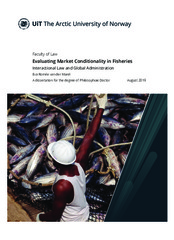| dc.contributor.author | van der Marel, Eva Romée | |
| dc.date.accessioned | 2021-02-21T09:40:37Z | |
| dc.date.available | 2021-02-21T09:40:37Z | |
| dc.date.issued | 2020-01-24 | |
| dc.description.abstract | Market measures in general command a degree of support by the international community, and have in particular become part of the global effort to prevent, deter, and eliminate IUU fishing. The EU, the largest market power in fish products in the world, is leading the way on this front, spear-heading country blacklisting mechanisms under the IUU and Non-Sustainable Fishing Regulations. Other important fisheries markets are moreover being encouraged (and some are interested) to follow suit. The EU’s measures are shown to have significant actual and potential transboundary impacts, especially on developing countries, which struggle most with IUU fishing and constitute the main target of the EU’s mechanisms. This thesis seeks to better understand how market conditionality in fisheries works, and to consider the legal issues to which such mechanisms give rise. Given that there is no indication that the international community considers unilateral, country-level market conditionality to be an appropriate tool to promote compliance with international fisheries norms, there is a need to think normatively about the conditions under which such mechanisms can be justified. | en_US |
| dc.description.doctoraltype | ph.d. | en_US |
| dc.description.popularabstract | Market measures in general command a degree of support by the international community, and have in particular become part of the global effort to prevent, deter, and eliminate IUU fishing. The EU, the largest market power in fish products in the world, is leading the way on this front, spear-heading country blacklisting mechanisms under the IUU and Non-Sustainable Fishing Regulations. Other important fisheries markets are moreover being encouraged (and some are interested) to follow suit. The EU’s measures are shown to have significant actual and potential transboundary impacts, especially on developing countries, which struggle most with IUU fishing and constitute the main target of the EU’s mechanisms. This thesis seeks to better understand how market conditionality in fisheries works, and to consider the legal issues to which such mechanisms give rise. Given that there is no indication that the international community considers unilateral, country-level market conditionality to be an appropriate tool to promote compliance with international fisheries norms, there is a need to think normatively about the conditions under which such mechanisms can be justified. | en_US |
| dc.identifier.uri | https://hdl.handle.net/10037/20584 | |
| dc.language.iso | eng | en_US |
| dc.publisher | UiT The Arctic University of Norway | en_US |
| dc.publisher | UiT Norges arktiske universitet | en_US |
| dc.rights.accessRights | openAccess | en_US |
| dc.rights.holder | Copyright 2020 The Author(s) | |
| dc.subject.courseID | DOKTOR-005 | |
| dc.subject | law | en_US |
| dc.subject | VDP::Social science: 200::Law: 340 | en_US |
| dc.subject | VDP::Samfunnsvitenskap: 200::Rettsvitenskap: 340 | en_US |
| dc.title | Evaluating Market Conditionality in Fisheries: Interactional Law and Global Administration | en_US |
| dc.type | Doctoral thesis | en_US |
| dc.type | Doktorgradsavhandling | en_US |


 English
English norsk
norsk